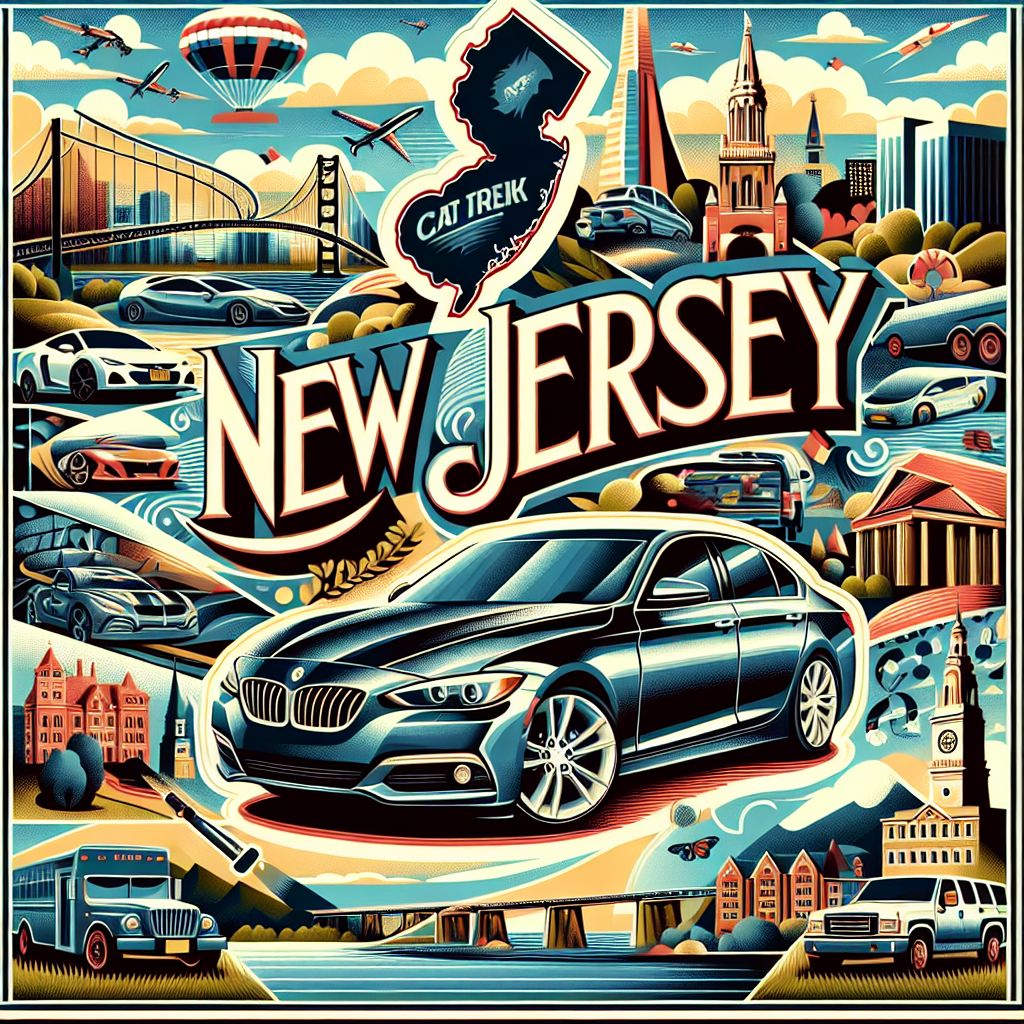
Key Takeaways
- In New Jersey, no tint is allowed on the windshield or front side windows.
- Medical exemptions are available for those requiring darker tints due to certain medical conditions.
- The back side windows and rear window can have any darkness of tint.
- Violations of tint laws can result in fines and being required to remove the non-compliant tint.
- Always verify with a professional to ensure your vehicle’s tint complies with New Jersey Motor Vehicle Commission (MVC) regulations.
Stay on the Sunny Side of the Law
If you’re looking to add window tint to your vehicle in New Jersey, it’s crucial to understand the rules to stay on the right side of the law. The state has specific regulations that dictate how dark your tint can be, and not following them can lead to fines and the hassle of removing your tint. But don’t worry, I’ll walk you through what you need to know to make sure your car is both cool and compliant.
Understanding New Jersey’s Tint Limits
Let’s start with the basics. New Jersey is pretty strict when it comes to window tinting. For instance, if you’re thinking about tinting your windshield, think again. It’s a no-go in the Garden State. But that doesn’t mean you can’t tint other windows on your vehicle. The key is to know which windows can be tinted and how much light your tint can block.
Reasons Behind the Regulations
You might be wondering why New Jersey is so particular about window tints. It’s all about safety. Tints that are too dark can obstruct a driver’s vision, especially during night time or in poor weather conditions. There’s also the matter of law enforcement; officers need to be able to see inside a vehicle during traffic stops. So, while these rules may seem strict, they’re there to keep everyone on the road safe.
MVC Regulations Breakdown
| Window | Allowed Tint Darkness | Medical Exemption |
|---|---|---|
| Windshield | No tint allowed 1, 2, 3, 4 | No exemption |
| Front Side Windows | No tint allowed 1, 2, 3, 4 | 35% VLT max on upper portion 3, 4 |
| Rear Side Windows | Any darkness allowed 1, 2, 3, 4 | Any darkness allowed 3, 4 |
| Rear Window | Any darkness allowed 1, 2, 3, 4 | Any darkness allowed 3, 4 |
| Other Regulations | No mirrored/metallic tint 1,4 Side mirrors required if rear tinted 4, No certification labels required 1 | Application process with physician certification 3, 4 |
References:
1 https://www.way.com/blog/legal-tint-nj/
2 https://www.tinting-laws.com/new-jersey/
3 https://www.jdpower.com/cars/shopping-guides/new-jersey-window-tint-law
4 https://www.rinaldolawgroupllc.com/legal-tint-in-nj/
Now, let’s break down these regulations a bit more. Remember, no tint on the windshield means just that—no stickers, no coatings, nothing. For the front side windows, the rule of thumb is that if you can’t see through them clearly, they’re probably too dark. The back windows are less restrictive, allowing you to go as dark as you like. But there’s a catch: if you darken the rear window, you must have dual side mirrors to compensate for the reduced visibility.
Front Windshield & Front Side Windows Rules
Example: You just got a new car and are considering a full tint for a sleek look and some privacy. However, in New Jersey, tinting the windshield is not just frowned upon, it’s illegal. Keeping your windshield free of any tint ensures that you have a clear, unobstructed view of the road ahead.
It’s clear then, that the front windshield and front side windows is off-limits for tinting. But let’s move on to the other windows where you have more freedom to customize.
Back Side Windows and Rear Tints
Example: You’re a parent who wants to keep the back seat cooler for your kids during those hot New Jersey summers. You’re in luck because you can choose any darkness for the back side and rear windows. Just remember, if you go really dark, you must have those dual side mirrors in place.
With the freedom to choose any tint darkness for the back side and rear windows, you can prioritize privacy and comfort. Just keep in mind that visibility is crucial, so always consider how tinting might affect your ability to see, especially at night.
Medical Exemption Protocols
For those with medical conditions that require protection from the sun, New Jersey offers an exemption from the standard tint laws. Conditions such as lupus, photosensitivity, and melanoma are examples where an exemption might be granted. If you believe you qualify, you’ll need to apply for an exemption through the New Jersey Motor Vehicle Commission (MVC).
Qualifying Conditions
Not every condition will warrant an exemption, and it’s essential to understand what qualifies. The MVC typically requires documentation from a licensed physician explaining the medical necessity for darker tints. The exemption isn’t just handed out; it’s a thorough process meant to balance individual health needs with safety regulations.
Application Process for Exemptions
The application process for a medical exemption is straightforward but requires attention to detail. You’ll need to:
- Obtain a letter from your physician detailing the medical necessity for tinting beyond the legal limit.
- Complete the necessary MVC application forms, which can be found on their website or at a local MVC office.
- Submit the application and wait for approval before applying any non-compliant tints to your vehicle.
It’s crucial to wait for this approval to avoid any legal issues or fines. Once you have the exemption, keep a copy in your vehicle at all times in case you’re stopped by law enforcement.

Accepted Tint Percentage & Reflectivity
Understanding what’s accepted in terms of tint percentage and reflectivity is key to making legal choices for your vehicle’s windows. In New Jersey tints should not be more than 35% reflective to reduce the risk of blinding other drivers.
Visible Light Transmission Explained
Visible Light Transmission, or VLT, is the amount of visible light that passes through the window tint. Higher VLT percentages mean more light passing through and thus a lighter tint. For example, a 70% VLT tint will appear much lighter and allow more light to pass through than a 5% VLT tint, which is much darker and allows less light to pass through.
Reflectivity Standards for Safety
Reflectivity in window tints refers to how much light is reflected away from the window. Non-reflective tints are preferred because they reduce the glare for other drivers. In New Jersey, the standard is that tints should not be more than 35% reflective. This helps to maintain visibility and safety for everyone on the road.
Check Before You Tint
Before you tint your vehicle’s windows, it’s important to check with a reputable professional to ensure the materials and application meet New Jersey’s standards. Choosing a credible service provider is crucial to avoid any legal issues.
How to Ensure Your Tint Meets NJ Standards
To ensure your tint meets New Jersey standards:
- Consult with a professional window tinting service that is familiar with New Jersey’s tint laws.
- Ask to see samples of legal tints and compare their VLT percentages to state requirements.
- Confirm that the reflectivity of the tint does not exceed the 35% maximum.
By taking these steps, you can enjoy the benefits of tinted windows without the worry of non-compliance.
Resources for Compliant Tinting Services
For reliable tinting services, look for businesses that offer a guarantee on their work and can provide documentation proving that the tint is within legal limits. Many reputable companies will know New Jersey’s regulations and can help you make an informed decision.
Penalties for Non-Compliance
Ignoring New Jersey’s window tint laws can lead to penalties. If your vehicle is found to have illegal tints, you may be issued a summons and face a fine. You will also be required to remove the non-compliant tint, which can be an additional expense.
Understanding the Fines
The fines for non-compliant window tinting can vary, but they typically start around $100. Repeat offenses can lead to higher fines and possibly points on your driver’s license. It’s not just about the money; it’s about adhering to regulations designed to keep all road users safe.
Remember, the goal is to enjoy the benefits of window tinting while staying within the boundaries of the law. With the right information and a bit of planning, you can achieve the perfect balance of style, privacy, and safety for your vehicle.
Picking the Right Tint Material
When it comes to selecting a tint for your vehicle, not all materials are created equal. You want to choose a tint that not only complies with New Jersey’s laws but also provides durability and UV protection. Look for high-quality, non-reflective polyester or carbon film tints that can block out harmful UV rays without getting you in trouble with the law.
Regular Tint Maintenance Tips
Maintaining your window tint will ensure it lasts and continues to look great. Clean your tinted windows with a soft cloth or a sponge, and avoid harsh chemicals that can break down the tint’s adhesive. It’s also wise to park in the shade whenever possible to prolong the life of your tint, as prolonged exposure to direct sunlight can cause tints to fade or bubble over time.

FAQ: Tinting Within the Lines
Can I tint my windshield in New Jersey?
The answer is a definitive no. New Jersey law does not allow any tint on the windshield. It’s a safety issue – clear windshields are vital for visibility. If you’re caught with a tinted windshield, you’ll be facing a fine and the inconvenience of removing the tint.
How do I get a medical exemption for window tint in NJ?
If you have a medical condition that necessitates darker window tints, you’ll need to go through the following steps:
- Get a written statement from your physician detailing why you need a darker tint.
- Fill out the New Jersey MVC’s application for tint exemption.
- Submit the application and wait for approval before getting your windows tinted.
Once approved, keep the exemption documentation in your vehicle at all times.
Are there penalties for incorrect window tinting?
Yes, if your window tint does not meet New Jersey’s regulations, you can be fined. The initial fine may be around $100, but it can increase with subsequent offenses. More importantly, you’ll be required to strip the illegal tint from your windows, which is an additional expense and hassle you want to avoid.
Does window tinting affect car insurance rates in NJ?
Generally, window tinting should not affect your car insurance rates in New Jersey. However, it’s always a good idea to inform your insurance company of any modifications to your vehicle. This ensures that your coverage is up to date and avoids any potential issues if you need to file a claim.





Leave a Reply